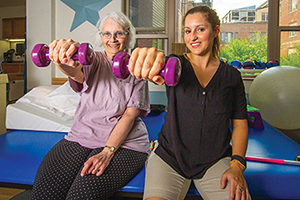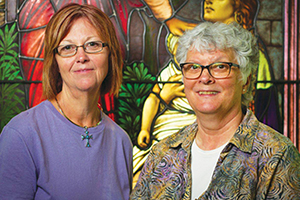Trinity consulting unit helps sponsors navigate transitions
By JULIE MINDA
For more than 50 years, the Sisters of St. Joseph of Lyon's province in Waterville, Maine, has sponsored Waterville's Mount Saint Joseph Residence & Rehabilitation. Initially the facility was one of several ministries but now it is the sisters' sole remaining sponsored work. Within the last several years, the sisters have recognized that they must relinquish sole sponsorship and make other changes to position the 138-bed skilled nursing facility for the future. A consulting unit within Livonia, Mich.-based Trinity Health is helping them to do so.
According to Sr. Gilla Dubé, CSJ, the congregation's provincial, the process of transitioning a beloved ministry "has been a journey… There's been a sense of loss — but a sense of it being a healthy loss, because there's a great assurance that this is the right thing to do. We want to ensure that decisions are made now to solidify Mount Saint Joseph's future."

Rachel Taggart, right, an occupational therapist at Mount Saint Joseph Residence & Rehabilitation of Waterville, Maine, conducts an occupational therapy session with resident Linda Huard. Trinity Senior Services Management is helping the facility's sponsors prepare to transition sponsorship of the ministry.
Bill Healy, vice president of Trinity Health's continuing care division, said the congregation is among many that have held onto stand-alone or very small long-term care ministries for many decades and now are grappling with sponsoring those ministries with fewer and fewer members available to assume leadership roles. Many congregations in this position also are sensing the need to better prepare for the future of long-term care, he said.
"Some have almost a crisis on their hands," Healy said. "Their long-term care ministries have served their communities for generations, and (the congregations are having to determine) how to sustain that ministry for the future with leadership succession not quite defined, reimbursements down and a business model changing."
Sr. Dubé said congregations in this position "should start the conversation as soon as possible. Don't wait until you are forced into making a decision."
Fast changes
Healy said that he's unaware of any formal research on the number of stand-alone eldercare facilities sponsored by religious congregations, but informal research suggests there are several hundred. This includes religious communities' sponsored skilled nursing, assisted living and other eldercare facilities as well as congregations' motherhouses that care for elderly retired sisters.
Healy said when it comes to such facilities, "when you've seen one, you've seen one." But, in general, he said, these long-term care ministries did not undergo the sweeping sponsorship and organizational changes that Catholic acute care facilities underwent decades ago because in some cases the facilities were also the homes of the sisters. Also, unlike hospitals, long-term care facilities generally were smaller, less complex to run and had simpler reimbursement structures to deal with. Healy said for these reasons many congregations felt it was premature to transition their sponsorship decades ago, since they still had the leadership capacity to run them.
But now, it is becoming more difficult for stand-alone senior care facilities to sustain themselves into the future, Healy said. It is becoming more complex to run them, in part because they are having to transition from a traditional nursing home model, in which the sole focus is on serving elderly people over the long term, to a blended model that includes post-acute care and a requirement that the facility compete as a destination for discharged hospital patients in need of rehabilitative and short-stay care. The transition requires operational changes, including retraining existing staff and hiring new staff able to handle patients with more acute medical needs.
Solutions
Trinity Senior Services Management is the management arm of Trinity Health's Trinity Senior Living Communities division. The management unit provides consultation services to religious communities contemplating the future of their long-term care ministries and motherhouses. It has long-term consulting contracts with nine congregations; it provides limited consulting for a specific need to two religious communities; and it is in talks with about a half dozen additional congregations, according to Healy.
Trinity Senior Services Management consultants can guide congregations in evaluating their sponsorship succession plans, including transition to greater lay sponsorship, if that is a need for their community.
The consultants also can provide operational, marketing, staffing and strategic planning guidance to help ministry sponsored facilities create post-acute care services that are attractive to hospitals under regulatory and financial pressure to reduce readmissions, Healy said.

Diane Sinclair, left, administrator of Mount Saint Joseph Residence & Rehabilitation with Sr. Gilla Dubé, CSJ, provincial of the Sisters of St. Joseph of Lyon. The women are working to position the facility for the future.
Trinity Senior Services Management has been consulting with Mount Saint Joseph for over a year. Diane Sinclair, the facility's administrator, said the consultants have helped Mount Saint Joseph staff up and build up new service lines so that the facility now can accept many more patient transfers from hospitals. Trinity also has helped the facility to improve its marketing in order to increase its patient census.
Trinity Senior Services Management is advising Mount Saint Joseph on its transition from its current sponsorship model — an "all-sister" board — to a governance model that includes both sisters and laity. Sr. Dubé said the eventual goal is for Mount Saint Joseph to join Trinity Health and transition sponsorship to Trinity Health's public juridic person, Catholic Health Ministries. Healy noted that several consulting clients have expressed unsolicited interest in joining Trinity Health.
Family business
Healy said that while it is urgent for sponsoring congregations to find solutions for their stand-alone long-term care ministries now, many religious communities are reluctant to do so, in part because of their natural emotional connection to the ministries. "A top challenge is that they are like a family business in every sense of the word. But no one is following them as in most family businesses. There is no legacy, and so they have to rely on folks outside of their family, to trust and to hand off their ministries."
Sr. Mary Haddad, RSM, is CHA senior director of sponsor services. She is helping to arrange a discussion titled "Long-Term Look at Long-Term Care" at a CHA sponsorship conference just prior to the August assembly of the Leadership Conference of Women Religious. In part, the presentation will cover the challenges facing congregations' stand-alone long-term care ministries. Sr. Haddad told Catholic Health World that it is an emotional experience for congregations to transition their ministries. Referencing the book After We're Gone: Creating Sustainable Sponsorships, Sr. Haddad said that just as individuals go through stages of grief during a loss, so too do congregations.
Sr. Dubé said that as the Sisters of St. Joseph were facing the realities for Mount Saint Joseph several years ago, there was "the messiness of emotions… Mount Saint Joseph has been part of our lives since 1965, we've sponsored it, provided and received care there and many of our sisters have died there… We needed time to let go and to grieve."
But, she said, the congregation knew that proactively transitioning Mount Saint Joseph into the future was the right thing to do. "I think we've been very courageous to make these decisions. It's about legacy for us."
| Organizations aim to aid financially strapped, elderly religious The problematic financial situation for congregations concerned with caring for their aging members goes beyond the issue of health care reimbursement, according to information from the nonprofit Support Our Aging Religious! SOAR! says women and men religious are ill-prepared for the costs of living beyond their retirement. For instance, they receive Social Security benefits valued at just about one-third of that of the average U.S. beneficiary. A May 1986 article in the Wall Street Journal that inspired SOAR!'s founding explored this and other dynamics of the sisters' financial situation. The article, which focused on the plight of women religious retiring from the Catholic school system, said that many sisters were applying for public aid since they had no means to support themselves in retirement. The article explained that sisters' wages and benefits had usually been determined at a diocesan level — and these wages generally had been very low and benefits meager. Because the sisters' compensation had been handled at a local level, no centralized organization had looked ahead toward the future, when sisters would retire and require support. So, very few sisters had funds in place as they began to retire. That article nearly 30 years ago generated broad public awareness of and concern for the sisters' situation; and inspired the creation of SOAR!, which raises funds to support women and men religious. The organization provides emergency grants to address the immediate physical needs of sisters, priests and other clergy — such as for handicapped accessible accommodations, medical equipment and physical therapy equipment. A year after SOAR!'s 1986 founding, the United States Conference of Catholic Bishops established its Annual Retirement Fund for Religious to help religious institutes build up the funds to pay for the long-term needs of retired and infirm women and men religious. This is according to information from SOAR!. SOAR! said the problem of under-funded liabilities for religious congregations will remain a challenge in the future, so it is continuing its awareness-building and fundraising activities, while also encouraging religious congregations to engage in long-term planning to address the core funding issues. |
Copyright © 2015 by the Catholic Health Association
of the United States
For reprint permission, contact Betty Crosby or call (314) 253-3477.